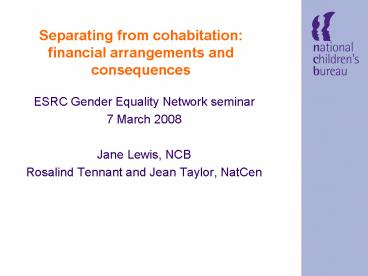Separating from cohabitation: financial arrangements and consequences PowerPoint PPT Presentation
1 / 15
Title: Separating from cohabitation: financial arrangements and consequences
1
Separating from cohabitationfinancial
arrangements and consequences
- ESRC Gender Equality Network seminar
- 7 March 2008
- Jane Lewis, NCB
- Rosalind Tennant and Jean Taylor, NatCen
2
Coverage of talk
- Separating from Cohabitation study methods
- what arrangements do couples make?
- who does badly out of it?
- how does this come about?
- how far would the Law Commission proposals help?
3
Separating from cohabitation study
- conducted by NatCen for DCA
- objectives to explore arrangements made,
impacts, processes, influences, role of advice
and support - qualitative research 29 in-depth interviews
(Aug to Nov 05) - sample frame created from national random
surveys - ONS Omnibus to identify separated cohabitants,
followed up by telephone screen - Financial Resources Survey (DWP) to identify lone
parents, payers/recipients of child support,
cohabitants 2-4 yrs ago, screened to identify
separated cohabitants and collect more
information - purposive sample selected and approached
- 6 group discussions with advisors (Nov to Dec 05)
- solicitors, CAB, CSA, lone parent orgs, housing
and welfare rights centres, counselling,
mediation
4
Profile of cohabitants
Children Children from relationship Lived with children from previous relationships Youngest child 0-5 6-10 11 11 6 6 5 6 Duration 0-2 years 3-4 Years 5-10 Years 11 Years 8 8 7 6
Home Man owned Women owned Jointly owned Renting 10 5 7 7 Advice None Solicitor CAB CSA Other 17 8 4 4 4
Recency of separation 3mths 2 years 3-4 years 21 8
5
What arrangements did couples make?
- divided resources by legal title or ownership
- sole owned houses kept by owner
- joint owned houses sold or kept and offset
- savings and possessions divided by ownership
- pensions not taken into account
- very little independent influence of
- contributions
- needs including of children
- equality
- legal entitlement
6
Who does badly out of it?
- depends on how you assess fairness
- assessed arrangements by notions of fairness
emerging from the research - ownership
- contribution
- equal division
- equal impact
- cohabitation law
- divorce law
7
Actually it doesnt much matter how you assess
fairness
- factors leading to disadvantage are fairly
consistent across frameworks - disadvantage arises from
- not owning the home or other assets
- making no or informal financial contributions
- being financially dependent during relationship
- being main carer of children
- esp from a previous relationship
- having no entitlement to state support
8
How does this come about?
- financial arrangements during relationship
Joint
Unequal
9
Financial arrangements during relationship
- unequal earnings, longer relationships, children
- joint home, different contributions,
joint/different accounts
10
Financial arrangements during relationship
- both earning, no children
- joint home, equal contributions, joint accounts
- unequal earnings, longer relationships, children
- joint home, different contributions,
joint/different accounts
11
Financial arrangements during relationship
- both earning, no children
- joint home, equal contribution, joint accounts
- unequal earnings, longer relationships, children
- joint home, different contributions,
joint/different accounts
- unequal earnings, children/assets from previous
relationships - sole-owned home, dependency.
12
Financial arrangements during relationship
- both earning, no children
- joint home, equal contribution, joint accounts
- influence of previous relationships
- retained separate homes, equal ad hoc
contributions
- unequal earnings, longer relationships, children
- joint home, different contributions,
joint/different accounts
- unequal earnings, children/assets from previous
relationships - sole-owned home, dependency
13
How does this come about?
- financial arrangements during relationship
- evolution of cohabitation and financial
arrangements - unspoken and contingent nature of jointness
- irrelevance of legal rights during relationship
- not enforcing full legal rights on separation
- not getting (adequate) legal advice
- assets too limited to make cohabitation law work
- inadequacy of current cohabitation law
14
How far would the Law Commission proposals help?
15
Jane Lewis jlewis_at_ncb.org.uk

